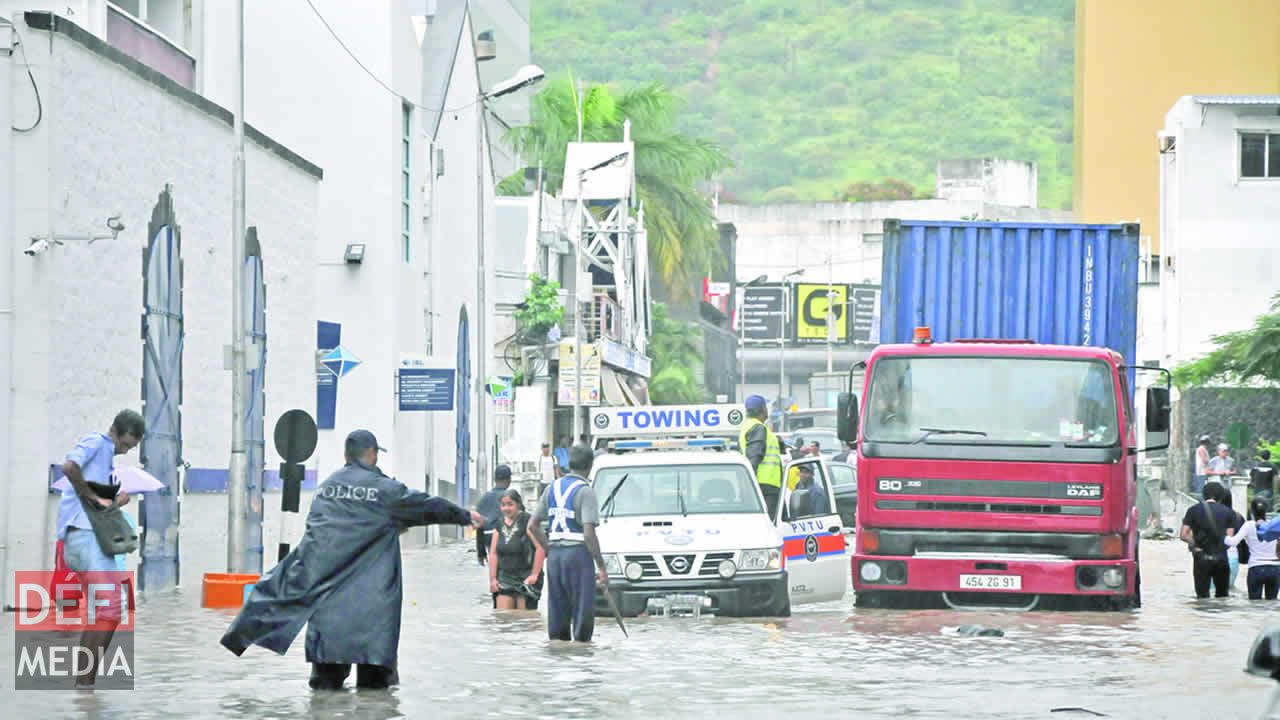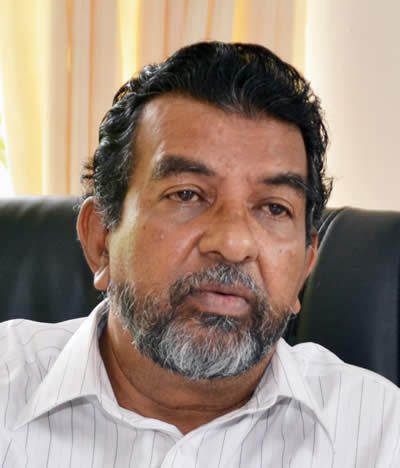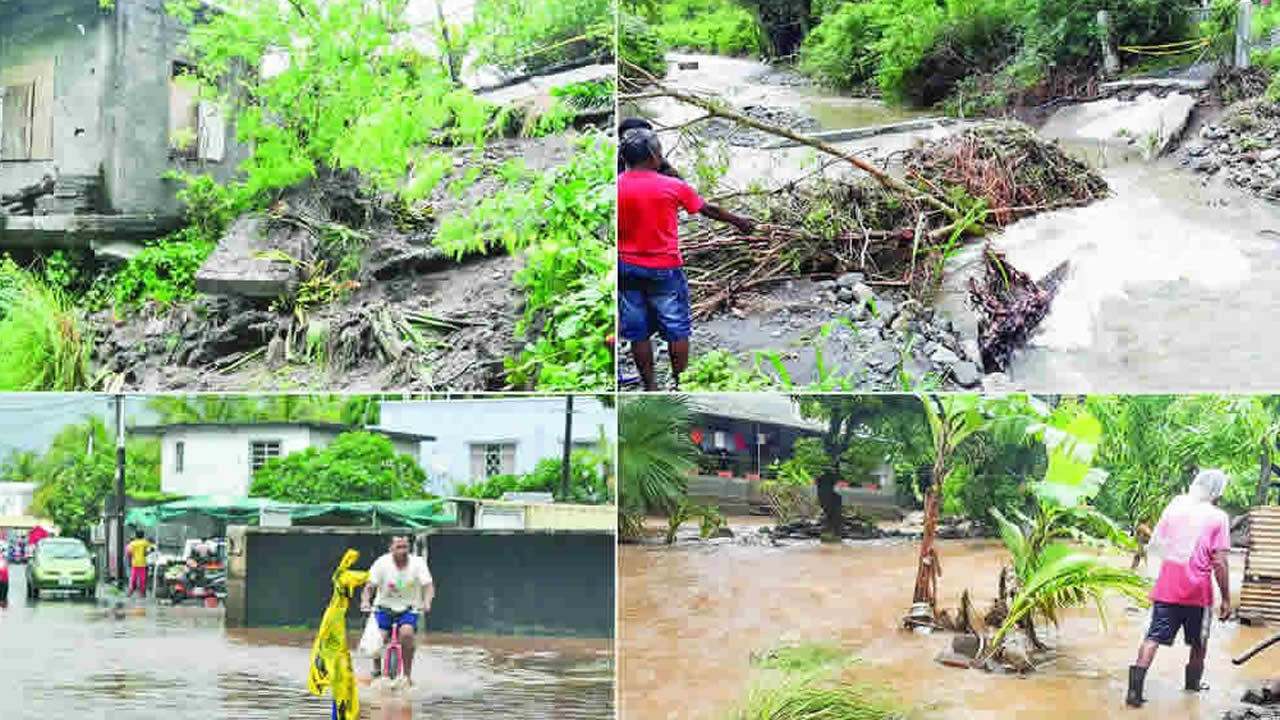

Mauritius is considered to be the 7th most exposed country to natural disasters out of 171 countries and ranked 19th in terms of risk because of the state of preparedness of the country. On the other hand, the recent summer outlook has observed that the frequency of extreme weather and climate events has increased in the Southwest Indian Ocean. Recent weather conditions make us ponder. Have we started to feel the impact of climate change? Are we under the threat of climate change?
Heavy/torrential rainfall leading to flash floods and violent thunderstorm and explosive intensification of cyclones are the main previsions given by the Meteorological services for this summer 2018-2019. It has been mentioned that tropical cyclones evolving in the vicinity of the Mascarenes Islands may generate high waves that are likely to reach the shores of Mauritius.
Additionally, temperatures will be slightly above normal and on some days may exceed by more than two degrees. With all the previsions, it seems clear that weather in Mauritius has undergone some changes. The main question is: Have we started to feel the impact of climate change? Are we in danger? Experts in the field shed light on this issue.

The impact
According to the Intergovernmental Panel on Climate Change (IPCC) 4th Assessment Report, climate is bound to impact Small Island Developing States (SIDS) and Mauritius is no exception. As per the report, by mid-century, climate change is expected to reduce water resources in many small islands to the point they become insufficient to meet demand during low-rainfall period, increase in temperature, increase in frequency and intensity of natural disasters like cyclone and flooding and deterioration in coastal conditions.
Oceanographer Vassen Kauppaymuthoo explains that the air mass around the world and the oceans are warming up at a rapid pace and the impacts of climate change are already being felt in Mauritius; the adverse impacts are already being experienced in terms of temperature rise, decrease in rainfall amount, sea level rise, accentuated beach erosion and increase in frequency and intensity of extreme weather events such as flash floods. “Climate records over the period 1951-2014 show a significant warming trend of about 1.2°C and a decreasing trend in rainfall amount of about 8%. Over the same period, the Central Plateau, the main recharge zone of the island, has witnessed a decrease in annual precipitation from a maximum of 4,000 mm/year to 3,800 mm/year with drying being more pronounced to the North and West.”

On her part, Meghna Raghoobar, co-founder and CEO of SYAH, underlines that impacts of climate change are not only imminent but could also be irreversible should no action be taken. “In fact, the impacts of climate change in all its various forms have already started to affect SIDS like Mauritius, Comoros and Maldives that are disproportionately more at risk when it comes to natural disasters. Recent heavy rainfalls in Mauritius leading to flooding quite a few times destabilized the whole country. Ten years ago, Mauritius suffered from torrential rains caused by the cyclone Lola, where four citizens, including a 13-year-old girl, lost their lives, and lots of houses and vehicles were damaged as well as other infrastructures. Years later, a deadlier flooding occurred with 152mm of rainfalls on 30th March 2013, causing the death of 11 people, garbage and mudslides overflowed the gutters with houses and buildings damaged. Cyclone Berguitta, which hit Mauritius and Reunion Island on January 2018 this year, caused torrential rains and flooding. Several areas on both islands were flooded and around 15 people were rescued from flood waters in Mauritius. In the last 11 years, small seismic activities were felt between Reunion Island and Rodrigues Island, ranging from 4.0 magnitude to 6.7 magnitude.”
Mamade Beebeejaun, former director of the Meteorological services, reveals that the effect of climate change is being felt worldwide. “Our greenhouse gases have been increasing over the past years, hence creating more energy in the atmosphere and the sea. That’s why we are having more violent rainfalls and rise in temperature.” Besides, the former director is worried about the acid rain. According to him, till now no analysis have been done to determine where we stand in this area.
Projected impacts of climate change in Mauritius
According to the Mauritius Meteorological Services, the projected impacts of climate change in Mauritius include:
- Decreasing trend of 8% in annual rainfall. Utilizable water resources will decrease by up to 13% by 2050
- Increase in heavy precipitation events with increased risk of flash flood
- More frequent heat waves in summer
- Increasing frequency of heat spells, giving rise to cardiovascular and pulmonary complications
- Increase in the number of intense tropical cyclones
- Increase in duration of dry spell
- Increase events of high energy waves (tidal surge) impacting the shores of Mauritius
- Heat stress will impact on productivity in the poultry and livestock sector
- Propagation of vector-borne and infectious diseases as a result of higher temperature and recurrent floods
- Lengthening of the transmission period of important vector-borne diseases due to rise in temperature

The greatest dangers for Mauritius
Meghna Raghoobar confides that SIDS feel the disproportionate effects of Climate Change. “Firstly, the absorption of excess amounts of CO2 by the oceans has made them warmer, causing them to rise and thus posing a serious threat to low-lying SIDS. This heat also impacts the coral reefs which are vital to us, causing them to bleach and blighting ecosystems upon which we rely largely for our livelihoods and tourism industry. It really saddens me to see the amount of dead coral beneath the oceans while diving with my team.”
Vassen Kauppaymouthoo underscores that Mauritius is highly exposed to extreme climatic phenomenon with serious risks to life and hard won development gain which includes basic amenities and properties. “The following seven key sectors, namely, agriculture, coastal resources and tourism, water resources, marine and terrestrial biodiversity, fisheries, human health and infrastructure are highly vulnerable to climate change including sea level rise. The adverse impacts will also have profound socio-economic implications.”
He lists the dangers as follows:
- Agriculture: Increase mortality in poultry and incidence of pests and crop diseases leading to a decrease in crop productivity, due to heat stress have been observed. “Saltwater intrusion has also been affecting agricultural farms situated in certain low lying coastal zones. A projected reduction in rainfall and an increase in evapo-transpiration may lead to as much as 15 to 25% decline in agricultural production by 2050.”
- Coastal Resources and tourism: “Accentuated beach erosion has shrunk the width of beaches around certain coastal areas in Mauritius by up to 10 meters over the eight years. Coral reefs are in a state of deterioration. Sea level has been rising at a rate of 5.6 mm/year since 2003. A projected increase in mean annual temperature extremes coupled with beach erosion can lead to a reduction in tourist arrivals accounting for a revenue loss of up US$ 50 million by 2050.”
- Water Resources: “There has been a decreasing trend in annual precipitation of about 8% compared to the 1950s coupled to an increase in rainfall variability and water scarce periods. Projections indicate that the utilizable water resources may decrease by up to 13% by 2050 if no action is taken to restore catchment areas.”
- Marine and Terrestrial Biodiversity: “In both Mauritius and Rodrigues, breeding and reproductivity of various plants and animal species are suspected to have already been affected by the changing climate. It is projected that there will be a greater proliferation of invasive alien species at the expense of native species, a decrease in pollinator activity due to shifts in plant phenology and coastal vegetation, turtle nesting, and wader visitation on low lying islets will be affected.”
- Fisheries: “Frequent fish mortality suspected to be linked to climate change observed in the nearshore around Mauritius. Projected increase occurrence of coral bleaching, would reduce coral biodiversity and fish species for both Mauritius and Rodrigues.”
- Human health: “An increase in frequency of vector borne diseases, particularly dengue, linked to variabilities in temperature, has been observed over the last decade. Climate change may increase the vulnerability of the health sector in the coming decades leading to higher disease burden with associated health cost and impaired socio-economic development in Mauritius.”
- Infrastructure: “Properties, buildings and roads have been affected or damaged due to flooding, erosion and landslide. For instance, Mauritius Port’s operations was suspended for 10 days in 2014 due to adverse weather conditions leading to USD 54M loss. It is projected that there will be accelerated softening and deterioration of bituminous pavement, surface and thermal cracks to concrete, increased corrosion of steel, scouring of foundations and embankment collapse and damage to buildings and power transmission masts in both Mauritius and Rodrigues.”
Is Mauritius ready?
Meghna Raghoobar believes that there is still a lot of work to be done in this arena. For instance, sorting our drainage system all over Mauritius. “We do not have an insurance that would permit to insure damages caused by flash floods for business and beyond.” In the wake of worsening climate change and accelerating sea level rise,
Mauritius has developed a number of policies and taken several measures to enhance the resilience of the country, says Vassen Kauppaymuthoo. He avers that the Government is also formulating a Climate Change Bill to establish a consolidated framework for climate change measures as well as the setting up of a National Climate Change Committee to strengthen coordination among key stakeholders.

Measures being taken
During the Private Notice Question in Parliament recently, the Minister of Environment Etienne Sinatambou stated that a National Multi-Hazard Emergency Alert System is being implemented to alert the public prior to and during a disaster. “In the same vein, two mobile applications have been developed to send alert messages to subscribers before, during, and after disasters. To further enhance our existing warning system, the Doppler radar will provide near real-time information of the impending disaster for the safety of the public.”
Furthermore, it has been indicated that since January 2018, 38 simulation exercises have been conducted both at national and local levels to prepare all first responders and vulnerable local communities and the population at large to better respond to disasters. “In line with section 18 of the National Disaster Risk Reduction and Management Act, a Disaster Response Unit has been set up this year, and it consists of a specialised unit of the Special Mobile Force, to assist disaster response operations from the National Emergency Operations Command, the Local Emergency Operations Commands and the Regional Emergency Operations Command.”
Actions needed
Vassen Kauppaymouthoo states Mauritius will have to find innovative solutions in order to adapt to the coming challenges. “It is time to restore or recreate native forests, conserve biodiversity, and improve ecosystems services such as regulation of water supply, soil conservation and air quality and promote the creation of local capacity to undertake research on the effects of climate change on biodiversity, and on ecosystem valuation. We need to plant mangroves, build wave breakers at sea and flood wall on the coastline to protect vulnerable on-land infrastructure and build elevated roads or relocate coastal roads more inland.”
Concerning infrastructure, he believes that we need to build new interceptor and road-side drains to channel surface run-off to the sea, rehabilitate, upgrade existing drains, reinforce the wearing surface of roadways by the use of fabric reinforcement, replace cladding, flooring and linings with water resistant materials and construct levees or floodwalls around them.
For Mamade Beebeejaun, the National Disaster should revamp itself. “The National Disaster should concentrate more on risk reduction rather being only an information management centre. We should have more means in terms of equipment, competence and know-how.”
Environmentalist Dr Vasantt Jogoo states that Mauritius need a clear policy to deal with climate change. “We should strike the right balance of development and environment. We should reduce our vulnerability and do a climate proofing for everything that we do, be it road or building.”
 J'aime
J'aime













